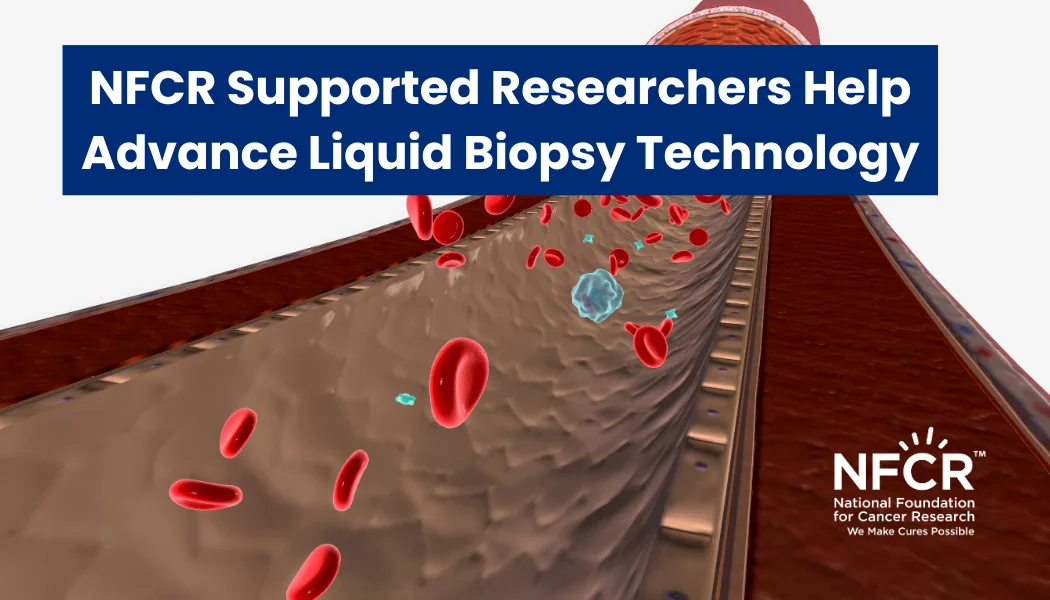Research Update: NFCR-Supported Scientists Advance Liquid Biopsy Technology

Two NFCR-supported researchers have recently published in the high-impact publication Nature Communications for their work on liquid biopsies and circulating tumor cells. Drs. Daniel A. Haber of Massachusetts General Hospital Cancer Center and Aditya Bardia of the University of California, Los Angeles, are corresponding and co-authors, respectively, of the paper titled Tumor cell-based liquid biopsy using high-throughput microfluidic enrichment of entire leukapheresis product.
Advances in Circulating Tumor Cell Technology
The paper discusses an innovative approach to liquid biopsy that involves using a significantly higher volume of blood samples from patients with metastatic cancer than a standard blood sample. This method allows for the capture of a much greater number of circulating tumor cells (CTCs) (counts ranging from 100 to 58,000).
Metastasis is responsible for 90% of cancer-related deaths. CTCs in patients’ bloodstream are cells that are metastasizing or spreading throughout the body. Information on a patient’s cancer deemed from the captured CTCs is invaluable to doctors and their patients, for example, to monitor responses to treatments.
In the new approach, approximately 5.8 liters of blood is collected, utilizing a ‘Leukopac’ system, which is similar to the volume needed for bone marrow transplantation and CAR-T cell preparation used in immunology treatments.
The researchers made significant modifications to their original CTC-ichip device and methods to accommodate this larger blood volume of the Leuopak, resulting in a new collection platform called the LPCTC-iChip.
The new technique aims to provide a more comprehensive liquid biopsy, paving the way for more effective and personalized cancer management strategies. More personalized treatments would, in turn, lead to better survivorship for cancer patients.
What is a Liquid Biopsy?
A liquid biopsy is a laboratory test done on a sample of blood, urine, or other body fluid to look for cancer cells from a tumor or small pieces of DNA, RNA, or other molecules released by tumor cells into a person’s body fluids—source: National Cancer Institute.
What are Circulating Tumor Cells?
Circulating tumor cells detach from solid tumors and circulate in the bloodstream. Since they are live cells from a patient’s tumor, they are considered a “liquid biopsy” of the tumor and offer the possibility of assessing—in real time—the tumor’s characteristics, evolution, and resistance/response to treatments.
Cancer Research Works! But only with our help. Please make a gift today to help advance breakthroughs in cancer research with NFCR.

About Dr. Haber
Dr. Daniel Haber has received NFCR support since 2000, which has helped yield many discoveries, including the development of the initial CTC-ichip. Dr. Haber is currently collaborating with Esther Rheinbay, PhD, also of Massachusetts General Hospital Cancer Center, to identify therapeutic targets that may lead to novel therapies for the most deadly subtype of breast cancer, triple-negative breast cancer (TNBC).

About Dr. Bardia
Dr. Aditya Bardia is working to address the unmet need of metastasis in aggressive triple-negative breast cancers using CTC detection technology with NFCR support. Dr. Bardia is using CTCs to develop a diagnostic test for one of the newest treatments, Antibody Drug Conjugates (ADCs), and accelerate the development of novel precision antibody-based therapies for patients with metastatic breast cancers.
Sign-up to Stay Informed About Cancer Research Breakthroughs with NFCR!
A world without cancer is possible. Help us turn lab breakthroughs into life-saving realities.

5.7 Million+
Donors who have fueled NFCR’s mission

$420 Million+
Invested in high-impact research & programs

36+ Labs & Hundreds of
Nobel Laureates & Key Scientists received NFCR funding, driving breakthrough research












